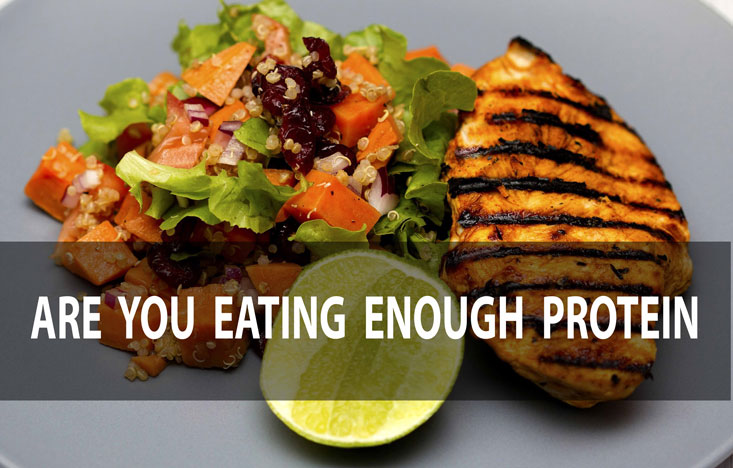Have you been told you need more protein?
Have you wondered if you are eating enough of it?
The supplement industry, magazines, websites, trainers, and athletes (1-2) heavily promote high protein diets. But these popular opinions do not necessarily match up with the recommendations by scientists.
Let’s do some math together.
How much protein do we need?
The current Recommended Dietary Allowance (RDA) is 0.8g of protein per kg bodyweight per day. (2-3) Supposedly, this is “the average daily intake level that is sufficient to meet the nutrient requirement for nearly all (98%) healthy individuals.”
To make it simple,
your weight (lbs) / 2.2 x 0.8 = how much protein you need a day
For an average American male who weighs 195 lbs (4), he needs 71 grams/day. An average American female, who weighs 166 lbs (4), needs 60 grams/day.
How much protein do Americans actually consume?
According to a 2015 study, 98 grams for men and 67 grams for women. (5)
Remember that the average male only needs about 71 g and female 60 g according to our previous calculation.
What about active individuals? Do they need more protein?
This is still a debatable question. There continues to be conflicting recommendations between US Dietary Reference Intakes and the US Dietetic Association. (2,3)
Generally 1.2-1.3g/kg/day (instead of 0.8g/kg/day) of protein intake is considered enough for athletes and individuals with moderate physical activity level. (6,7)
If we do a quick calculation, that is 106 grams for a male athlete with an average weight of 195 lbs. 106 grams is not too far off from the 98 grams average American males are consuming already.
For female it is a different story. 90 grams is quite a bit more than 67grams, which is what average American women consume a day. The good news is that the difference is nothing an omelet cannot make up for.
So if you are a woman who exercises regularly, you may want to pay a bit more attention to your protein intake.
Keep in mind that protein does not only come from meat and beans. A cup of cooked oatmeal contains 6g of protein. A bagel contains 10g. One cup of cooked white rice contains over 4g. My point is, you are probably eating than you thought you were.
Bottom line
- Extra protein is converted to fat. (8)
- Too much protein is associated with (1)
- bone loss
- kidney disorders
- cancer
- liver disorders
- coronary artery disease
- Plant-based protein may reduce cardiovascular disease risk (9)
- As of now, there is no reasonable scientific data supporting a high protein diet due to potential disease risks (1)
References:
- Delimaris I. Adverse effects associated with protein intake above the recommended dietary allowance for adults. ISRN Nutr. 2013;2013:126929.
- Phillips SM, Moore Dr, Tang Je. A critical examination of dietary protein requrements, benefits, and excesses in athletes. Int J Sport Nutr Exerc Metab. 2007 Aug;17 Suppl:S58-76.
- Phillips SM. Dietary protein requirements and adaptive advantages in athletes. Br J Nutr. 2012 Aug;108 Suppl 2:S158-67.
- http://www.cdc.gov/nchs/fastats/body-measurements.htm
- Pasiakos SM, Agarwal S, Lieberman HR, Fulgoni V. Sources and amounts of animal, dairy and plant protein intake of US adults in 2007-2010. Nutrients. 2015 Aug;7(8):7058-7069.
- Poortmans JR, Carpentier A, Pereira-Lancha LO, Lancha Jr A. Protein turnover, amino acid requirements and recommendations for athletes and active populations. Braz J Med Biol Res. 2012 Oct;45(10):875-90.
- Wu G. Dietary protein intake and human health. Food Funct. 2016 Mar;7(3):1251-65.
- Pesta DH, Samuel VT. A high-protein diet for reducing body fat: mechanisms and possible caveats. Nutr Metab. 2014;11:53.
- Richter CK, Skulas-Ray AC, Champagne CM, Kris-Etherton PM. Plant protein and animal proteins: do they differentially affect cardiovascular diesese risk? Adv Nutr. 2015 Nov 13;6(6):712-28.
About the Author
Dr. Lily Semrow is a Board Certified Chiropractic Neurologist who focuses on Neuro-Structural Correction. She has a B.S. in Nutrition and a doctorate in Chiropractic. She has a passion for serving families, and helping people who could not get better through traditional and alternative means.

